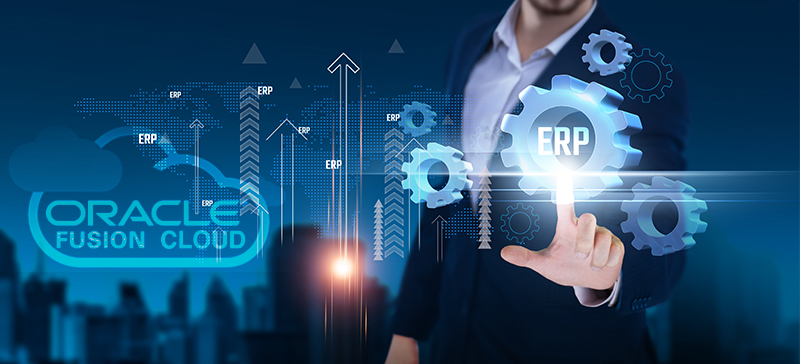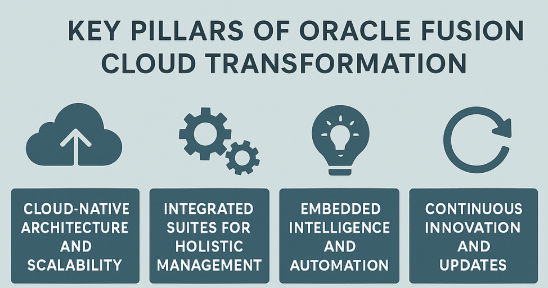
The landscape of enterprise resource planning (ERP) is undergoing a profound transformation, driven by the relentless pace of technological innovation and the increasing demand for agility and intelligence in business operations. At the forefront of this evolution is Oracle Fusion Cloud ERP, a comprehensive suite of applications designed to redefine how organizations manage their core processes. This blog post delves into how Oracle Fusion Cloud is not just adapting to, but actively shaping the future of ERP systems.
For decades, ERP systems have been the backbone of enterprises, integrating various functions like finance, human resources, and supply chain management. However, traditional, on-premise ERP software often suffered from rigidity, high maintenance costs, and limited scalability. These legacy systems, while foundational, struggled to keep pace with the demands of a rapidly changing global economy.
The advent of cloud computing brought a paradigm shift. Cloud ERP emerged as a more flexible, scalable, and cost-effective alternative. Oracle, a long-standing leader in enterprise software, recognized this shift and invested heavily in developing Oracle Fusion Applications, a suite built from the ground up on a modern, cloud-native architecture. This strategic move positioned Oracle to lead the charge in ERP digital transformation.
Oracle Fusion Cloud ERP is more than just a cloud-hosted version of traditional ERP. It represents a fundamental rethinking of enterprise resource planning in the cloud. Built on Oracle Cloud Infrastructure (OCI), it offers a robust, secure, and high-performance foundation. The suite integrates a wide array of functionalities, including Oracle HCM, SCM, and Financials, providing a unified platform for managing critical business operations.
One of the key differentiators of Oracle Fusion Cloud is its emphasis on intelligent business processes. The system leverages advanced analytics, machine learning, and artificial intelligence to automate tasks, provide actionable insights, and support data-driven decision-making. This move towards AI-powered ERP is a significant step beyond mere automation, enabling predictive capabilities and proactive management.
The Oracle Fusion Cloud transformation is characterized by several core pillars that collectively contribute to its revolutionary impact on ERP:

Unlike many "lift-and-shift" cloud solutions, Oracle Fusion Cloud ERP was designed as a cloud-native ERP solution. This means it fully leverages the elasticity and resilience of the cloud, allowing businesses to scale resources up or down as needed. This inherent scalability is crucial for organizations experiencing rapid growth or fluctuating demands, eliminating the need for costly hardware upgrades and extensive IT management.
Oracle Fusion Cloud offers a truly integrated suite of applications. This seamless data integration across finance, supply chain, human capital management, and more eliminates data silos and provides a single source of truth for all business operations. This holistic approach is a significant improvement over disparate systems that often lead to inefficiencies and reconciliation challenges.
The incorporation of AI and machine learning is a hallmark of Oracle Fusion Cloud. From intelligent process automation in financial closing to predictive analytics in supply chain planning, these capabilities transform reactive operations into proactive strategies. ERP automation tools embedded within the platform streamline routine tasks, freeing up human resources for more strategic initiatives.
As a SaaS ERP software, Oracle Fusion Cloud benefits from continuous updates and innovations delivered directly by Oracle. This means businesses always have access to the latest features, data security patches, and technological advancements without the burden of manual upgrades. This commitment to Oracle Fusion innovation ensures that the platform remains at the cutting edge of enterprise technology.
The benefits of migrating to Oracle Fusion Cloud ERP are multifaceted, impacting various aspects of an organization's operations and strategic objectives:
The Oracle Fusion Cloud roadmap for modern ERP transformation is continuously evolving, with Oracle consistently adding new functionalities and enhancing existing ones. This commitment ensures that Modern ERP solutions offered by Oracle remain competitive and relevant. Future developments are expected to further deepen the integration of emerging technologies like blockchain, IoT, and advanced analytics, making the platform even more powerful.
The cloud-native ERP features in Oracle Fusion are designed to maximize the benefits of the cloud environment. These include:
Understanding the breadth of Oracle Fusion Cloud ERP modules explained provides insight into its comprehensive nature. Key modules include:
These modules work synergistically to provide a unified view of an organization's financial and operational health.
In conclusion, Oracle ERP modernization is not just a trend; it's a strategic imperative for businesses aiming to thrive in the digital age. Oracle Cloud and specifically Fusion Cloud are at the forefront of this revolution, offering modern ERP solutions that are intelligent, integrated, and agile. By embracing Cloud-based ERP platforms like Oracle Fusion Cloud, organizations can unlock unprecedented levels of efficiency, insight, and innovation, truly shaping the future of ERP systems and their own competitive advantage. The journey towards an intelligent, connected enterprise is well underway, and Oracle Fusion Cloud is proving to be a powerful catalyst in this ongoing transformation of Oracle business applications.
Here's an FAQ on how Oracle Fusion Cloud is shaping the future of ERP systems, with a focus on ChainSys's role:
1: How does Oracle Fusion Cloud ERP's future-readiness benefit from partners like ChainSys?
Oracle Fusion Cloud ERP, with its inherent AI, ML, and automation, provides a strong foundation. ChainSys enhances this by specializing in seamless data migration, integration, and data quality. Their AI-driven Smart Data Platform, with thousands of pre-built templates and connectors, accelerates deployment, ensuring businesses leverage Oracle's cloud capabilities with clean, accurate, and readily available data.
2: What specific data challenges does ChainSys address in the context of Oracle Fusion Cloud ERP?
ChainSys tackles critical data challenges during Oracle Fusion Cloud ERP adoption, such as complex migrations from disparate legacy systems (Oracle EBS, SAP, etc.). They ensure data quality, governance, and master data management, preventing inconsistencies and duplicates. This "data-first" approach ensures businesses migrate and operate with a single, trusted source of truth within their new Oracle ERP environment.
3: How does ChainSys accelerate the implementation and value realization of Oracle Fusion Cloud ERP?
ChainSys's low-code/no-code Smart Data Platform and pre-built accelerators significantly reduce the time and effort traditionally required for ERP implementations. By automating data extraction, transformation, and loading (ETL) and providing real-time data validation, they enable faster go-live dates and minimize business disruption. This expedites time-to-value for businesses investing in Oracle Fusion Cloud.
4: What role does AI play in ChainSys's approach to Oracle Fusion Cloud ERP projects?
ChainSys leverages AI for various aspects of ERP projects. This includes AI-driven tools for data quality assessment, cleansing, and anomaly detection, which help identify and resolve data issues proactively. AI also enhances their data governance protocols and facilitates intelligent automation across the data journey, making the migration and ongoing management of data in Oracle Fusion Cloud more efficient.
5: How does ChainSys contribute to better data management and ongoing success with Oracle Fusion Cloud ERP?
Beyond initial migration, ChainSys provides solutions for ongoing data integration, governance, and analytics within the Oracle Fusion Cloud ecosystem. They enable real-time data synchronization across various systems, enforce data policies enterprise-wide, and offer robust reporting capabilities. This ensures businesses maintain high data quality and derive continuous, reliable insights from their Oracle Fusion Cloud ERP system.
